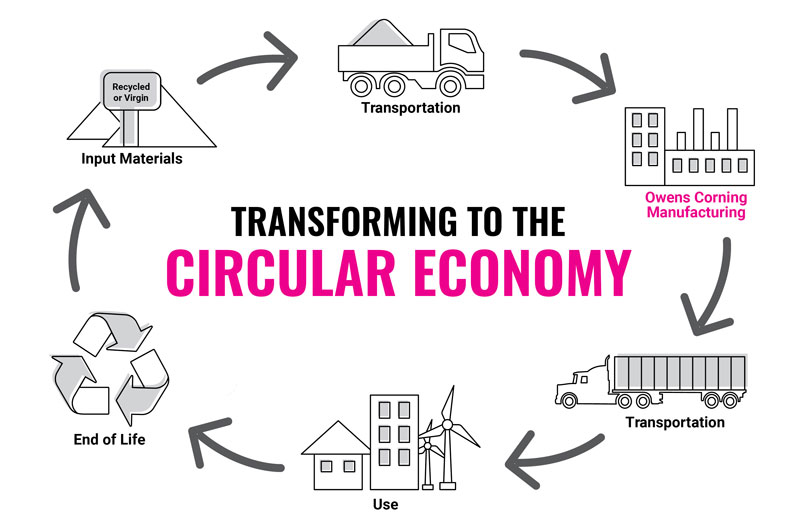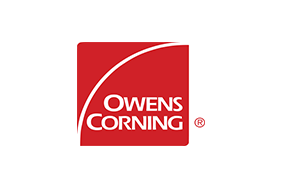Owens Corning’s Approach to Building the Circular Economy
Published 02-23-21
Submitted by Owens Corning

February 23, 2021 /CSRwire/ - In the past, manufacturers used a straightforward, linear model to produce their goods: extract raw materials, build the products, discard the waste, and throw everything away when it’s no longer in use. The result? Depleted natural resources, increased pollution, and overflowing landfills. Clearly, an unsustainable model in every sense of the word.
Today, Owens Corning is taking every opportunity to transform our operations to a circular economy model, one in which virgin raw materials, waste, energy and emissions are minimized through intelligent design, renewable and recycled input, energy-efficient production, and enabling the recycling of products at the end of their life cycles.
Our commitment to this transformation is part of our 2030 sustainability goals, which reflect our aspiration to meet the needs of today while making the world a better place for the future. Over the past two decades, our sustainability journey has evolved from a focus on improving our environmental footprint to a holistic perspective that includes product, social, and environmental goals. As we take stock of how far we’ve come and what is still needed, the circular economy is a critical next step in bringing our sustainability goals to life.
“This work requires a long-term view, dedication, and resources,” said Brian Chambers, Chairman and Chief Executive Officer of Owens Corning. “That’s why we have established a new circular economy team to work full-time toward our goal of building a circular economy model to further our sustainable growth strategy.”
The circular economy team, led by our chief sustainability officer, will define goals and prioritize projects that accelerate our ambitions to reduce waste, find ways to recycle and reuse materials, and build partnerships to solve end-of-life issues for Owens Corning products and applications. Owens Corning’s decades-long march in reducing CO2 emissions and increasing recycled content provides an actionable foundation for the circular economy. With the link between climate action and the circular economy becoming clear, we will incorporate this in our strategies to build a more sustainable future.
Frank O’Brien-Bernini, Senior Vice President and Chief Sustainability Officer, said, “This new team consolidates and builds on existing work done over the past decades. It will be a hub for thought leadership, expertise, and shared learnings that can drive progress bigger, further and faster.”
The team will partner with subject matter experts and teams across our company and with other key stakeholders in the industry to execute plans. This structure creates shared accountability for meeting our goals. The circular economy is not a “sustainability team initiative” but a challenge, opportunity and goal shared by all businesses and functions, in all regions. The new organization will have two focus areas:
- Manufacturing. Through this work, we will pursue the innovations needed to meet our 2030 goal of reducing the waste generated by our processes by 50%, and then find ways to reuse or recycle the rest. This will include expanding the use of recycled materials in our manufacturing operations and our products, across all businesses.
- End-of-life solutions. Innovative technologies and business models are needed to enable our products and materials to be reused and repurposed indefinitely. We are currently conducting a search for the leader of this team, who will be an influential balance of business strategist and technology champion. They will partner with their R&D, commercial and corporate development counterparts to shape the vision and execution of the next leap in Owens Corning Sustainability. View job posting
We expect significant synergy between the manufacturing and end-of-life initiatives as we create business opportunities to reclaim customer waste, deconstruct end-of-life products, and discover uses for those recovered materials in our operations and products.
Contact: Todd Romain, 419.248.7826

Owens Corning
Owens Corning
Owens Corning is a building products leader committed to building a sustainable future through material innovation. Our products provide durable, sustainable, energy-efficient solutions that leverage our unique capabilities and market-leading positions to help our customers win and grow. We are global in scope, human in scale with more than 25,000 employees in 31 countries dedicated to generating value for our customers and shareholders and making a difference in the communities where we work and live. Founded in 1938 and based in Toledo, Ohio, USA, Owens Corning posted 2024 sales of $11.0 billion. For more information, visit www.owenscorning.com.
More from Owens Corning

